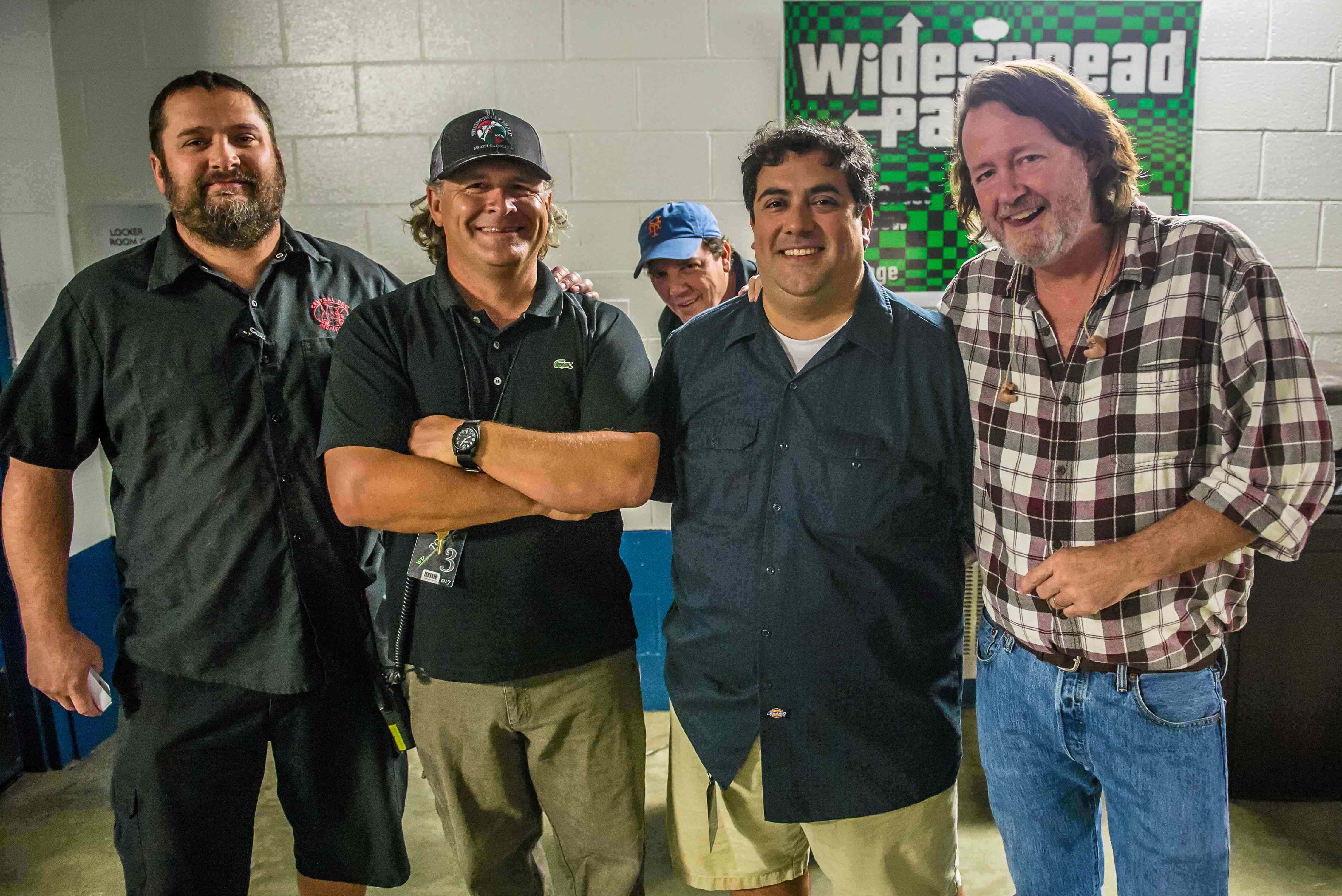 Joshua N. Timmermans
Joshua N. Timmermans
(L to R) Mike Smith (Production Manager), Jeff Duckworth (Merchandise), John Herman (Keys), Steve Lopez (Tour Manager), John Bell (Lead Vocals & Guitar)
Widespread Panic will play the Orpheum for two nights, October 18th and 19th. The Athens, Georgia-based jam band is in their 28th year of touring and still play from 70 to 100 dates a year, despite the members being in their 50s and older. None of that deters the new and long-time fans who follow the group and come to multi-night engagements.
Manning the helm of their nightly show is production manager and Memphian Mike Smith, who has worked with the band on and off since 2001, and who has done work for TCB Entertainment, the North Mississippi Allstars, and Big Ass Truck. I was a member of that last band and watched Smith learn the trade. He’s come a long way from being a bank teller (he counts cash like a machine) to our small van to managing a daily retinue of 50 people over 15-hour days.
“When we were doing Big Ass Truck, you had an AAA card and a pocket full of quarters,” Smith recalls of early tours in the 1990s before smart phones. “Now, everyone has everything they need to know on the phone. It was just riding through the night. If you broke down and something happened … It’s amazing.”
[jump]
“It’s shifted over the years for sure,” Smith said while on a break from setting up in the Von Braun Center in Huntsville, Alabama. “When I started for the Allstars, it was similar to my role with Big Ass Truck: a little bit of everything, helping load in, helping sell merch. But when it comes to the larger acts, they have a tour manager and a production manager. The tour manager just handles the artist and their needs on a day-to-day basis: making sure hotels, press, and things like that are covered. The production manager handles everything related to the show itself. My responsibility includes dealing with all the vendors we use: trucking companies, staging companies, pyrotecnics. I deal with all the vendors and work within the budget they’ve given me for the show. I advance the show in terms of production aspect. I determine the load in time and load out times. The number of personnel has changed over the years. When I was working for Big Ass Truck, there were one or two of us working for the band. When it was the Allstars, there were three or four of us. Now, we are a 26-person traveling crew, not including the band themselves. I manage 26 individuals on the road every day. Today we’re loading into the Von Braun Center in Huntsville and have about 26 stagehands that are working for us.”
Touring is Panic’s bread and butter. The job requires tremendous discipline and professionalism, even within the seemingly relaxed atmosphere of a Widespread show.
“When you work for Panic, who don’t sell a lot of records anyway, touring is their revenue stream; it’s how they make their money,” Smith says. “It’s amazing to see, with how elaborate a show we put on, how cost-effective it is. We keep everything in check cost-wise on a regular basis. It’s not like when we were promoting and doing shows like Foo Fighters, who are selling millions of records and using shows as a marketing tool to sell more records. They throw money at touring, but it’s really like throwing marketing dollars at selling a record. People who know me know that I don’t get mad very often. I don’t yell and scream. Some production managers have that stigma. We like to have a good time in a laid-back environment. But at the same time, we have to be very professional. So they know if Mike Smith is mad, there’s a major problem. Someone’s at risk of getting hurt or something.”
It’s a good gig that has more than it’s share of great nights and good feelings.
“The Panic guys do some outrageously cool things like Tunes for Tots. We play a benefit show in a city. And whatever city they play in, they donate the proceeds to a local high school band. Since 2005, they’ve raised $2.5 million for this program. So a little over $200,000 has gone in each year. It’s amazing. We’ve had band directors tell us they were expecting a few drum sticks and things like that and then how amazed they were when a semi-truck showed up full of everything. I never knew that they have to pay licensing on all of the sheet music they use. That’s an outrageous expense for a high school. This covers all of the licensing. It’s great when you enjoy what you do, and it’s a nice twist when it’s something good at the end. We do food drives at every show. Our management ties into the local food bank at every show. Since 2008, we’ve raise over $80,000 in donations. So at the end of the day, we feel like we had a great show and were able to do something positive.”